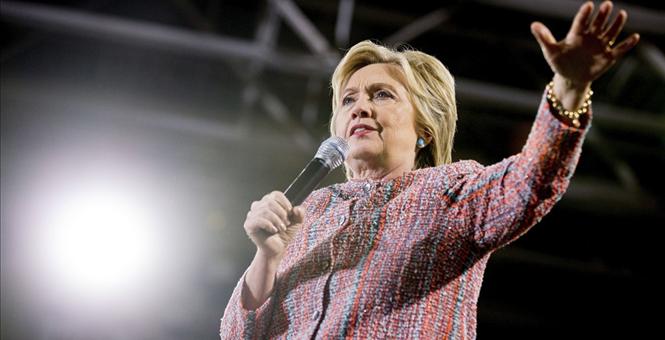Clinton Fatigue Still Strong Then and Now
By Fred Lucas
TownHall.com

Bill Clinton may have saved Barack Obama’s bacon
in 2012, but we’ve barely heard a peep from him
during his wife’s presidential campaign. Just as the
former president’s speech upstaged the current
president’s speech at the 2012 Democratic National
Convention in Charlotte, Bill’s remarks in
Philadelphia are near certain to overshadow
Hillary’s.
Nevertheless, Democratic presidential nominee
Hillary Clinton might actually be wise to keep Bill
off the trail going forward, or at least limit him –
and not because she doesn’t want to share the
spotlight. He was a staple in her failed 2008
primary campaign, thus Obama essentially defeated
both Clintons. For all we know, Obama might have
beaten Hillary by more in 2008 had Bill not been her
surrogate-in-chief. However, history tells us that a
Clinton boost is the exception rather than the rule.
The phrase “Clinton fatigue,” hasn’t been used
prominently since 2000, which I write about in my
new book, “Tainted
by Suspicion: The Secret Deals and Electoral Chaos
of Disputed Presidential Elections.”
In 2000, the Republicans held their convention in
the same city Democrats are gathering this year. The
Philly convention in 2016 will be all about Hillary.
The last Philly convention was all about Bill, as I
wrote:
Speaker after speaker at the Philadelphia convention
referred to the “Clinton-Gore administration” and
Vice Presidential nominee Dick Cheney gave a
memorable acceptance speech: “Mr. Gore will try to
separate himself from his leader’s shadow, but
somehow we will never see one without thinking of
the other.
During his speech accepting his party’s nomination,
George W. Bush acknowledged the good economy, but
told the convention, “Instead of seizing this
moment, the Clinton-Gore administration has
squandered it.”
Al Gore had not yet chosen a running mate,
butTime wrote, “Bush made the decision for him. He
picked Bill Clinton.”
Donald Trump and supporters have already dealt a
devastating blow to the Clinton machine, saying
Hillary was an “enabler”
for Bill’s treatment of women over the decades of
their political rise – which has made it difficult
to attack Trump’s comments about women. That is
particularly true since women on the receiving end
of the Clinton attacks have spoken out this year.
That in itself could make Bill Clinton nearly as
much a liability for his wife in 2016 as he was for
his vice president in 2000, as “Tainted by
Suspicion,” further explains:
Gore’s team had to address the Clinton fatigue
matter and did so with its choice of moderate
Connecticut Sen. Joe Lieberman to serve as vice
president. Lieberman was the first Democrat in 1998
to speak out against Clinton on the Senate floor,
saying: “Such behavior is not just inappropriate, it
is immoral and it is harmful, for it sends a message
of what is acceptable behavior to the larger
American family, particularly to our children.”
This 1998 speech assured his place on the Democratic
ticket two years later. As The Wall Street
Journal said: “Al Gore has picked someone as far
away from his president as he could go and still
stay within his own party. … Now, with his Lieberman
selection, Mr. Gore is all but admitting that his
boss could cost him the election.”
Trump has high negatives too, and might well be one
of the few Republicans Hillary could beat. However,
it seems unlikely the other contenders would have
taken on Bill’s past as head on as Trump has, which
has so far muted a “war on women” campaign from
Democrats.
But as likable as we always hear Bill is compared to
his wife, his campaigning and endorsement record has
been less than stellar – to be charitable. In 2006,
he interestingly campaigned for Joe Lieberman in the
Connecticut’s Democratic Senate primary, which
Lieberman lost (though he won the general as a third
party candidate without Clinton’s blessing). Bill
stumped for California Gov. Gray Davis in the 2003
recall election, for New York Democratic mayoral
candidate Fernando Ferrer in 2005, for Democratic
presidential candidate John Kerry in 2004, Allison
Grimes in the 2014 Kentucky Senate race, and others.
That’s not to say he should be blamed for the
losses. But, make no mistake, Bill Clinton would not
intervene in a race that was not winnable. He
endorsed some winners along the way, like Barak
Obama, who would have won without hin in 2008.
So props to the former president for assisting Obama
in 2012, a year when American swing voters were
looking for an excuse to vote for the more likable
Obama over the bland Mitt Romney, despite the
condition of the country. Bill Clinton provided that
excuse, using his own credibility on the economy to
argue no one could have fixed this mess in four
years. But claiming he has a Midas touch ignores his
endorsement record for congressional
candidates in 2012 and other years.
Hillary’s numbers have been sliding since FBI
Director James Comey cleared her in the email
scandal, because it doesn’t pass the public’s smell
test. Bill might well have been likable enough skate
in the court of public opinion. But even though the
public didn’t want to see him removed from office
over the Lewinsky scandal, they didn’t approve of
him outside his handling of the economy.
The couple’s reputation for unethical behavior is
embedded in the American conscious. There could
likely be enough anti-Trump sentiment to win in
November. But Clinton fatigue is still strong and
many voters likely aren’t sure they want to endure
this in the White House again.

